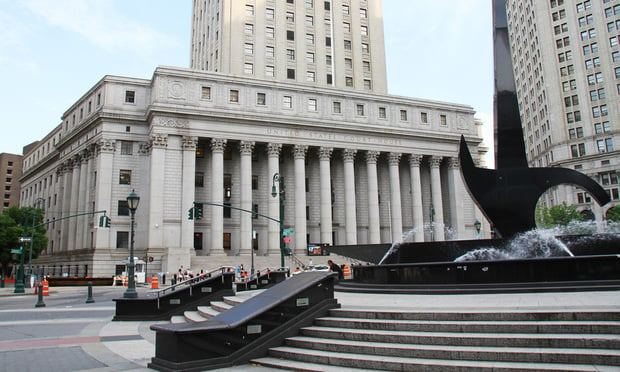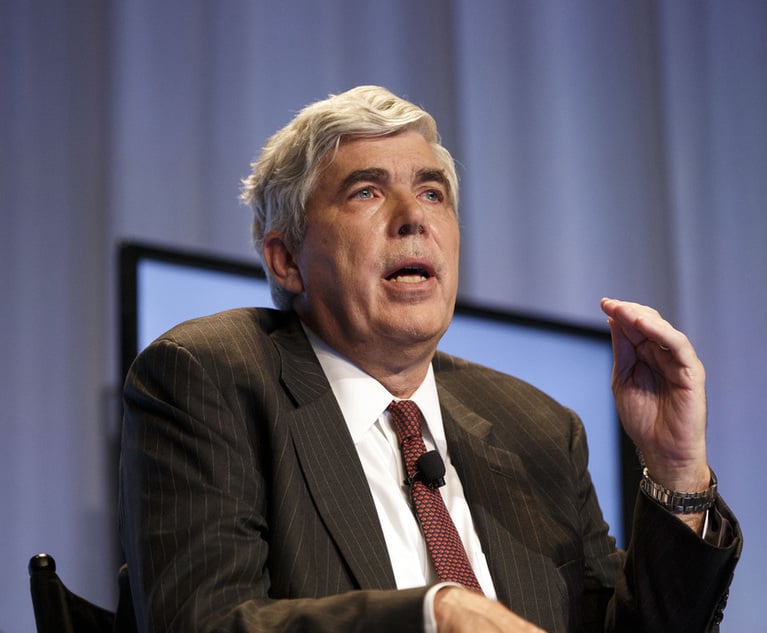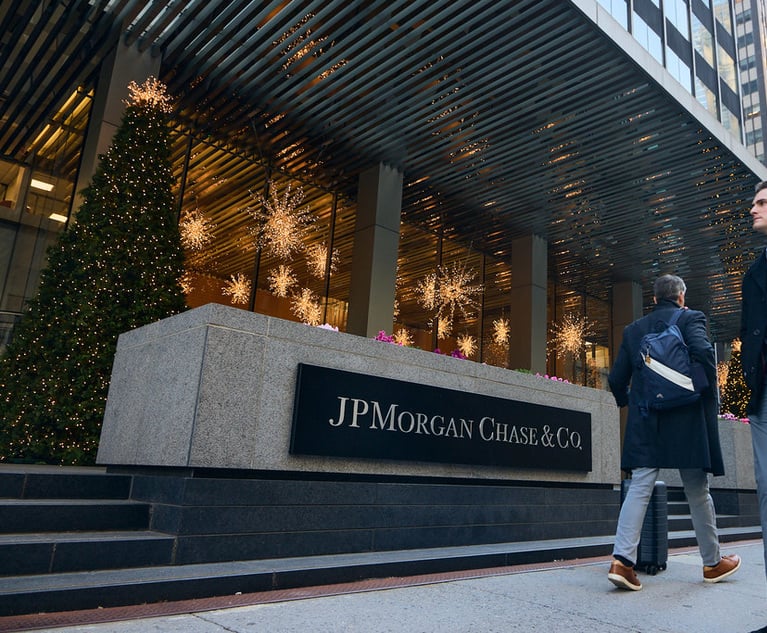Creditors Can't Recover From Tribune Investors Cashed Out in 2007 Leveraged Buyout, 2nd Circuit Rules
A three-judge panel of the Manhattan-based appeals court said that the creditors' state law claims for constructive fraudulent conveyance were preempted by a provision of U.S. bankruptcy law, which protects certain transactions involving securities contracts.
December 19, 2019 at 06:30 PM
3 minute read
 U.S. Court of Appeals for the Second Circuit. Photo: ALM
U.S. Court of Appeals for the Second Circuit. Photo: ALM
A group of creditors from the Tribune Media Co.'s 2008 bankruptcy cannot recover money paid to the defunct firm's investors in leveraged buyout before the company filed for Chapter 11 protection in Delaware, the U.S. Court of Appeals for the Second Circuit ruled Thursday.
A three-judge panel of the Manhattan-based appeals court said that the creditors' state law claims for constructive fraudulent conveyance were preempted by a provision of U.S. bankruptcy law, which protects certain transactions involving securities contracts.
The U.S. Supreme Court last year narrowed the scope of the Section 546(e) safe harbor to exclude certain fraudulent transfers made through the "conduit" of a financial institution to a third party, giving new hope to creditors claiming that billionaire Samuel Zell's 2007 leveraged buyout had overpaid investors in exchange for returning their shares to Tribune.
U.S. District Judge Denise Cote of the Southern District of New York, however, denied their motion to amend the complaint in light of the high court's ruling, finding that Tribune was itself a "financial institution" that qualified for protection under the bankruptcy code. On appeal, the creditors argued that they regained the ability to pursue their state law claims after the bankruptcy trustee declined to pursue them within the two-year statute of limitations provided by federal law.
But Second Circuit Judges Ralph K. Winter and Christopher F. Droney said Thursday that the theory created a number of "ambiguities, anomalies and outright conflicts" with the federal bankruptcy statute. Among them, the judges said, was the possibility that bankruptcy proceedings could be held up while creditors pursue "piecemeal actions" brought by creditors.
"This is precisely opposite of the intent of the code's procedures," the judges wrote in a 75-page opinion.
"Any trustee would have grave difficulty negotiating more than a nominal settlement in the federal action if it cannot preclude state claims attacking the same transfers but not requiring a showing of actual fraudulent intent," Winter and Droney wrote. "Unable to settle, a trustee will be reluctant to expend the estate's resources on vigorously pursuing the federal claim while awaiting the stayed state claims to revert and to be litigated by creditors."
The judges were joined by U.S. District Judge Alvin K. Hellerstein of the Southern District of New York, who sat by designation.
In addition to the "disruptive effect" of the creditors' position, there were bigger policy concerns regarding the efficiency of securities market, which are subject to extensive federal regulations.
The appeals court noted that the broad language of 546(e) was meant to protect the market from "after-the-fact unwinding of securities transactions," which could expose investors in public companies to "substantial" risks.
For instance, the judges said, players in the market would face increased uncertainty surrounding their transactions, and institutional investors would find securities markets far more risky if they were exposed to liabilities from securities investments they made long ago.
"A lack of protection against the unwinding of securities transactions would create substantial deterrents, limited only by the copious imaginations of able lawyers, to investing in the securities market," they said.
Read More:
Weil Facing Sharp Fee Objections in Ditech Bankruptcy
EXCO Bankruptcy Illustrates Power of Chapter 11 Restructuring
Madoff Trustee Loses Bid to Recover $343M From Citi in Clawback Suit
This content has been archived. It is available through our partners, LexisNexis® and Bloomberg Law.
To view this content, please continue to their sites.
Not a Lexis Subscriber?
Subscribe Now
Not a Bloomberg Law Subscriber?
Subscribe Now
NOT FOR REPRINT
© 2025 ALM Global, LLC, All Rights Reserved. Request academic re-use from www.copyright.com. All other uses, submit a request to [email protected]. For more information visit Asset & Logo Licensing.
You Might Like
View All
Trump Mulls Big Changes to Banking Regulation, Unsettling the Industry


Trump's SEC Overhaul: What It Means for Big Law Capital Markets, Crypto Work
Trending Stories
- 1$15K Family Vacation Turned 'Colossal Nightmare': Lawsuit Filed Against Vail Ski Resorts
- 2Prepare Your Entries! The California Legal Awards Have a New, February Deadline
- 3DOJ Files Antitrust Suit to Block Amex GBT's Acquisition of Competitor
- 4K&L Gates Sheds Space, but Will Stay in Flagship Pittsburgh Office After Lease Renewal
- 5US Soccer Monopoly Trial Set to Kick Off in Brooklyn Federal Court
Who Got The Work
Michael G. Bongiorno, Andrew Scott Dulberg and Elizabeth E. Driscoll from Wilmer Cutler Pickering Hale and Dorr have stepped in to represent Symbotic Inc., an A.I.-enabled technology platform that focuses on increasing supply chain efficiency, and other defendants in a pending shareholder derivative lawsuit. The case, filed Oct. 2 in Massachusetts District Court by the Brown Law Firm on behalf of Stephen Austen, accuses certain officers and directors of misleading investors in regard to Symbotic's potential for margin growth by failing to disclose that the company was not equipped to timely deploy its systems or manage expenses through project delays. The case, assigned to U.S. District Judge Nathaniel M. Gorton, is 1:24-cv-12522, Austen v. Cohen et al.
Who Got The Work
Edmund Polubinski and Marie Killmond of Davis Polk & Wardwell have entered appearances for data platform software development company MongoDB and other defendants in a pending shareholder derivative lawsuit. The action, filed Oct. 7 in New York Southern District Court by the Brown Law Firm, accuses the company's directors and/or officers of falsely expressing confidence in the company’s restructuring of its sales incentive plan and downplaying the severity of decreases in its upfront commitments. The case is 1:24-cv-07594, Roy v. Ittycheria et al.
Who Got The Work
Amy O. Bruchs and Kurt F. Ellison of Michael Best & Friedrich have entered appearances for Epic Systems Corp. in a pending employment discrimination lawsuit. The suit was filed Sept. 7 in Wisconsin Western District Court by Levine Eisberner LLC and Siri & Glimstad on behalf of a project manager who claims that he was wrongfully terminated after applying for a religious exemption to the defendant's COVID-19 vaccine mandate. The case, assigned to U.S. Magistrate Judge Anita Marie Boor, is 3:24-cv-00630, Secker, Nathan v. Epic Systems Corporation.
Who Got The Work
David X. Sullivan, Thomas J. Finn and Gregory A. Hall from McCarter & English have entered appearances for Sunrun Installation Services in a pending civil rights lawsuit. The complaint was filed Sept. 4 in Connecticut District Court by attorney Robert M. Berke on behalf of former employee George Edward Steins, who was arrested and charged with employing an unregistered home improvement salesperson. The complaint alleges that had Sunrun informed the Connecticut Department of Consumer Protection that the plaintiff's employment had ended in 2017 and that he no longer held Sunrun's home improvement contractor license, he would not have been hit with charges, which were dismissed in May 2024. The case, assigned to U.S. District Judge Jeffrey A. Meyer, is 3:24-cv-01423, Steins v. Sunrun, Inc. et al.
Who Got The Work
Greenberg Traurig shareholder Joshua L. Raskin has entered an appearance for boohoo.com UK Ltd. in a pending patent infringement lawsuit. The suit, filed Sept. 3 in Texas Eastern District Court by Rozier Hardt McDonough on behalf of Alto Dynamics, asserts five patents related to an online shopping platform. The case, assigned to U.S. District Judge Rodney Gilstrap, is 2:24-cv-00719, Alto Dynamics, LLC v. boohoo.com UK Limited.
Featured Firms
Law Offices of Gary Martin Hays & Associates, P.C.
(470) 294-1674
Law Offices of Mark E. Salomone
(857) 444-6468
Smith & Hassler
(713) 739-1250







